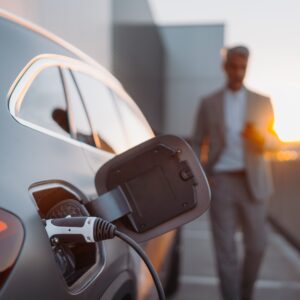
Insights
Should You Be Installing a Retail Charge Point Network?

As EV adoption continues to rise, retailers who own real estate face a critical decision on whether, and how, to implement a charge point network. Often described as a nexus of charge points that enables EV owners to charge their vehicles, track which charge points they engage with, and predictably know which adapters are available, charge point networks can deliver long-term benefits to retailers as well as consumers.
While some retailers have opted to implement and own their own charge points, others have looked to third-party Charge Point Operators (CPOs) to implement and manage a network of charge points on their behalf. Whether seeking to own your own charge points or leverage a third-party CPO, the choice of which model your business pursues carries significant long-term implications for the future of your business and should be handled with utmost consideration. In this article, the CAPRAplus team will help you explore which operating model, if any, makes the most sense for your greater business model.
Why Work with a CPO?
In recent years, CPOs like EVgo or EV Connect have established themselves as a lower-cost option for real estate owners to install charge points at their locations. Under this model, the CPO covers up-front costs associated with site engineering, electrical and infrastructure work, and construction of the charge point network. Once constructed, the CPO then owns and manages the charger screen and footprint, the consumer-facing mobile app, as well as all payment operations and pricing. In return, the CPO then provides a share of net income and revenue back to the retail site (or whomever they signed the agreement with).
It must be noted, however, that the CPOs retain no real investment in the growth of your brand. Moreover, as they own all customer data and branding on their charge points, a recent case study published in the Convenience Leaders Vision Group relates that there is no identifiable increase in foot-traffic associated with leveraging CPO charge points.
“By covering up-front costs and long-term operations, CPOs can offer easy money today. But this comes at the cost of flexibility,” cautions Matt Beale, Partner at W. Capra. “As many CPOs require long-term contracts to justify significant up-front investments, retailers may find themselves locked into a deal that, several years from now, no longer reflects the charging landscape.”
Prioritizing Flexibility
Of course, the primary benefit of operating your retail charge point network independently is that you maintain control of the consumer experience. Beale adds, “As you own the asset financially under this model, you maintain the freedom to design your customer experience from the ground-up, integrating branding, loyalty, payments, and pricing into your existing omnichannel offering.” In conjunction with controlling the consumer experience, organizations own the customer data in an independent model, and can leverage that data to make informed decisions on the future of their brand.
The financial and operational commitment required to independently operate a charge point network remains the biggest obstacle for retailers. Beyond the obvious lift in design work and construction, to maintain a charge point program requires a dedicated team to focus on pricing management, preventative maintenance, and field maintenance.
Which Model is Right for My Business?
There are a few key factors that each business should evaluate when considering whether and how to implement a charge point network. Site footprint, including the number of retail sites a business owns and where they’re located, is key. To ultimately monetize the network, your site count and potential upside will justify your investment in geographic areas with reasonable EV adoption rates.
Cost will always be an essential consideration. Though there are potential relief outlets from programs like NEVI or CFI (grant programs that the CPOs themselves are leveraging), the benefits associated with these programs may take years to be impactful. Per Beale, “Any retailer looking to own and operate its own charge point network should not only establish a well thought out process of applying for grants, but also ensure a sufficient strategy to manage the capital required for up-front costs.”
In the end, however, each retailer’s choice must come down to a view of the market. Though DC fast charging has not yet been profitable in its nascent phases, W. Capra continues to explore advancements in EV charging and battery charging as EV adoption rates grow. For those looking to establish a firm stance on whether their organization can begin to market, and make money on, EV charging, W. Capra works with their clients to provide critical guidance on how to proceed, offering evaluation frameworks to help your business navigate the best path forward.
Matt Beale, Partner at W. Capra, is the firm’s Architecture lead and is dedicated to assisting W. Capra clients with thinking through EV considerations. For further discussion, contact Matt at mbeale@wcapra.com.
Related Insights
The Cost of Poor Quality Assurance for Point-of-Sale and Back Office Systems in Petroleum Retail
Quality Assurance (QA) is vital to ensure that those who use the tool daily can replicate basic functions AND access the advanced technology and process automation they were promised during sales demos.
CSP Magazine – What C-Store Retailers Need to Do to Succeed in 2025
This article, by W. Capra’s Tom Newbould as a guest author, was published in the February 2025 edition of CSP […]
Navigating the Future of Electric Vehicles Amidst Administrative Change
As we bid farewell to 2024 and welcome 2025, the future of the electric vehicle (EV) market in the US […]
The Changing Role of the CIO
It used to be that a retailer’s chief information officer would spend most of his or her time concerned with […]
Want to stay in touch? Subscribe to the Newsletter











